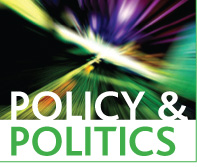This section of Discover Society is provided in collaboration with the journal, Policy and Politics. It is curated by Sarah Brown.
In today’s popular debate about democratic governance, it is sometimes said that we are entering a new era of ‘post-truth’. In North-America, the Trump administration has introduced the idea of ‘alternative facts’, automatically putting the validity of the ‘normal’ facts at stake. Also, in the United Kingdom, the Brexit campaign revealed a thriving opposition towards ‘the experts’ and their scientific knowledge. One might expect that the dawning of post-truth times should be of great concern to policymakers. After all, science and expertise are cornerstones of their work. It is what shapes their thinking and what provides them with legitimacy. So what would it mean for them when the once guaranteed authority of science starts to crumble?
And yet, such legitimacy worries seem to be rather out of place when we look at what is happening meanwhile in the backstage of public policy. In a growing number of governments, an influential megatrend is taking place, going by the name of ‘Behavioural Insights’. This trend shares very little with ‘post-truth’, in fact, it very much believes in the existence of hard facts, the possibilities of producing them and using them to successfully manage societal challenges. In essence, the Behavioural Insights movement seeks to infuse the policy process with new understandings in the field of behavioural science – often providing insights into the ‘more-than-rational’ nature of human decision-making.
More specifically, this movement cleverly combines two ideas. One is the notion of Nudge, which boils down to making subtle, psychologically-informed environmental readjustments for social good. The other is the Randomized Controlled Trial (RCT), which excels in assessing the causal effects of singular policy interventions. Behavioural Insights in this sense can be seen as a continuation of an ongoing evidence-based policy agenda, albeit with a psychological twist. Thus far, it has made considerable advances in becoming an established and exclusive player in the policy arena. Various governments, from the UK to the Netherlands, from Singapore to Qatar, now employ so-called ‘Behavioural Insights Teams’ (BITs), ‘Chief Behavioural Officers’, and ‘Nudge Experts’.
The designs of these new Nudge professional roles are quite logical and at times even ingenious. For instance, the leading BIT in the UK undertook efforts to make one simple default change – from opt-in to opt-out – in the pension plans of UK citizens in various regions. Their status quo bias was ‘exploited’ to overcome their present bias. This resulted in millions more people now saving money for their future. Such examples, showing how small changes produce big effects, demonstrated with ‘killer charts’, make clear why the use of behavioural insights has aroused such enthusiasm.
Rather than a shift towards post-truth, it is as if a deep modernist hope has been reignited: that today’s superwicked problems – from obesity to the climate crisis – can be solved after all. And even better, nudge-solutions consist of simple ‘choice architectural’ readjustments targeting individual behaviour, therefore raising the promise of social change without things getting too costly, oppressive, or disruptive. In this sense, Behavioural Insights do not only fit a modernizing but also a neoliberal agenda, seeking to responsibilize citizens to alter their problematic behaviours rather than change the underlying socio-economic, political, and institutional structures that underpin such behaviours.
Behavioural Insights protagonists have made few attempts to downplay the great expectations about their alleged radical potential for policy success. On the contrary, they continue to play a savvy ‘politics of expertise’, presenting themselves as the deliverers of a new policymaking approach with infinite possibilities for application. The success of this promotion campaign need not be a surprise as, after all, this field is inhabited by experts in persuasion and image-building. Hence, the expectations are high. Can the modernist project be taken to the next level now that the Nudge pioneers have come on the scene? Hope is placed in the hands of these experts, with their ability to identify and tap into our mental shortcomings, find out ‘what works’ through rigorous field experiments, and redesign our ‘choice architectures’ for the better.
And yet, the public policy scholar cannot help but reflect on the inconsistencies within this newly emerging field, and the rationalist hopes and fantasies it has stirred up. More particularly, its frontstage role models adopt a rather curious view about how the worlds of science and policymaking interact. Echoing the ideals of modernity, they see science as something that only serves a rational-instrumental purpose. Policymaking for them is a diagnostic matter of defining a problem, gathering the hard facts, and then deriving the most optimal solution. Under such a view, the fitting role of the Behavioural Insights expert is that of a ‘choice architect’, applying the science of behaviour to design, implement, and evaluate a host of behaviour change interventions.
There is one problem however: such a rational-instrumental view no longer holds after decades of research on the not-so-instrumental-but-instead-quite-political role of evidence and expertise in the policy process. Evidence-based policy is more a normative ideal than an actual description of how policies are made. At most, we find that policies can be loosely informed or inspired by evidence, but even then, it must be acknowledged that policymaking is subjected to a far-reaching ‘politics of evidence’. Herein, evidence gets fabricated, cherry-picked, downplayed, ignored, or shaped through other filtration mechanisms.
Hence, one wonders whether the rational-instrumentalism that prevails at the frontstage of Behavioural Insights is representative of what really goes on backstage when governments start to embrace behavioural science. The question is what policymaking in the era of Nudge means. Are governments experiencing the rise of a new technocrat, the ‘nudgeocrat’, continuously setting up field experiments and tweaking citizens’ everyday environments? In my recent research article, published in Policy & Politics, I explore this by asking a very basic research question: what do upcoming behaviour experts in government actually do? To find answers, I did ethnographic fieldwork over the course of 16 months, studying behaviour experts in Dutch central government directly.
A core insight gained from the study is that the everyday practice of behaviour experts, at least those in the Netherlands, is complex and precarious. Rather than framing them as mighty nudgeocrats – playing the role of policy designer, implementer, and evaluator at once – they are more aptly described as ‘knowledge brokers’. They build networks, circulate knowledge, and translate abstract ideas into relevant tools. Much of their efforts go into persuading their peers of their added value, and trying to strengthen their institutional positions. Getting that authorization is not easy. Behaviour experts are new kids on the block, pushing a complex set of knowledge and skills that is not per se welcomed in a status-quo driven policy environment. Moreover, as knowledge brokers, behaviour experts tend to operate ‘at’ and ‘in between’ organizational boundaries, which can create role ambiguity and make it harder to receive organizational recognition and support.
In the article, I identify three key practices of behaviour experts, and show how those fit better with the notion of knowledge brokerage than with the interventionist idea of choice architecture. I show that, for a substantial part of their time, behaviour experts are busy analysing policies, working to get a richer and more accurate understanding of particular policy challenges. They try to arrive at a more precise formulation about what actually is the problem, what is the specifically desired behaviour, and what exactly are the behavioural drivers that lead people to behave as they do. I also show that behaviour experts spend much time building behaviourally-informed capacity, giving workshops and lectures, building networks of expertise, and developing guidelines and tools, in order to get their policy peers to start using behavioural insights. Lastly, I show that, indeed, sometimes behaviour experts do take up the role of choice architect. However, when they do, they often do so as co-choice architects, operating in wider collaborative networks, or as contra-choice architects, not rolling out their own nudges but instead regulating the nudges that are implemented in the private domain, preventing consumers from being illegitimately manipulated through the commercial use of behavioural insights.
This article started by observing two opposite developments. In popular debates about democratic governance, announcements are being made of a so-called era of post-truth. Meanwhile, in the backstage of public policy, a Behavioural Insights megatrend is thriving that seems to take us straight back to the old ideals of modernity: to manage society through hard fact-finding. However, the article helps to see a more ambiguous reality, in which the modern behaviour change experts are neither ‘post-evidence’ nor the naive heralds of modernity. That is, while they are indeed strong believers in the possibility of rigorous evidence-based policy, they also act from a deeper understanding about the role of expertise in the policy process that transcends a simplistic rational-instrumental view. They, either explicitly or implicitly, understand that evidence is not straightforwardly ‘used’. To become effective, it has to be moved around, translated and made relevant for policymakers. It has to be ‘sold’ and ‘brokered’. This realization compels us not to judge the new Nudge experts too quickly by their interventionist front. Behind it, we find a rich palette of knowledge brokerage activities.
Joram Feitsma is a PhD candidate in the School of Governance, Utrecht University.
Image Credit: Pixabay

